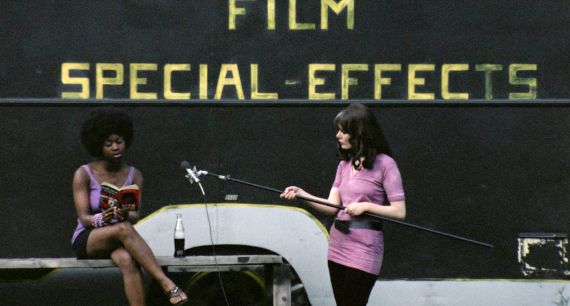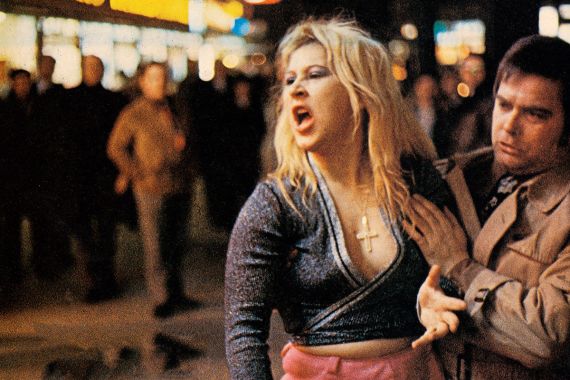
Eva Mattes in ›Supermarket‹ (FRG 1974, R: Roland Klick)
© Filmgalerie 451, Quelle: Deutsche Kinemathek
An Alternate Cinema – From the Deutsche Kinemathek Archives
Discover outstanding works beyond the canon from the Kinemathek’s holdings!
Retrospective of the 74th Berlin International Film Festival
The Retrospective of the 2024 Berlin International Film Festival will celebrate unorthodox protagonists, idiosyncratic cinematic language, and unconventional productions from German film history that stepped outside the box. The 23 films in the section, made between 1960 and 2000, draw on the holdings of the Deutsche Kinemathek, whereby most will be shown in their latest restored versions.
As film movements sparked by young players emerged worldwide in the 1960s, German filmmakers also spread their wings in a variety of ways. The desire for a personal future apart from society’s conventions is reflected in the Retrospective films alongside the relationship between society and the individual. These films, made outside the mainstream, deliver a different picture of the country and its people, tell a different, wider story. Their narratives are situated in the here and now, and visualise in sometimes experimental ways an alternate picture of society.
The unconventional, idiosyncratic cinematic language evident in the Retrospective selection is telling – sometimes observationally distanced or opulently displayed, sometimes with playful self-mockery or a subjective sense of self-awareness. The Retrospective programme “An Alternate Cinema” is an invitation to re-discover the diversity of voices in this wide-ranging selection of wonderfully made filmic experiences.
Films
-
Banale Tage (Banal Days)
GER 1991, directed by Peter Welz

© Michael Schaufert/DEFA-Stiftung
Starring Christian Kuchenbuch, Florian Lukas, Kurt Naumann, Jörg Panknin
In 1970s East Berlin, two teenagers rebel against pervasive paternalism. In settling accounts with everyday and cultural life in East Germany, this film farce from the environs of Berlin’s Volksbühne theatre tried out a new cinematic language.
-
Chapeau Claque
FRG 1974, directed by Ulrich Schamoni

© Bärenfilm, Source: Deutsche Kinemathek
Starring Ulrich Schamoni, Anna Henkel, Jürgen Barz, Peter Ehlebracht
A bankrupt young industrialist goes all out on the idea of the “leisure society”. In his artfully run-down villa in leafy Berlin, he enjoys and preaches the “right to idleness”. A pleasant, frivolous summer étude that takes a few satirical pot shots.
-
Dark Spring
FRG 1970, directed by Ingemo Engström

© Ingemo Engström, Source: Deutsche Kinemathek
Starring Edda Köchl, Ilona Schult, Irene Wittek, Klara Zet
During a fictional road movie, women from the director’s circle talk about relationships and ideal love. The director’s thesis film for the Munich film school HFF, it represents an early example of taking stock of feminist positions.
-
Das deutsche Kettensägenmassaker (The German Chainsaw Massacre)
GER 1990, directed by Christoph Schlingensief

© Filmgalerie 451
Starring Karina Fallenstein, Brigitte Kausch(-Kuhlbrodt), Susanne Bredehöft, Volker Spengler
After re-unification, former East Germans are massacred in the West by a family of cannibal butchers. The satirical horror film was a garish, blood-drenched commentary on the assimilation of the “brothers and sisters from the other side of the wall”.
-
Denk bloß nicht, ich heule (Just Don’t Think I’ll Cry)
GDR 1965/1990, directed by Frank Vogel

© Jörg Erkens/DEFA-Stiftung
Starring Peter Reusse, Anne-Kathrein Kretzschmar, Hans Hardt-Hardtloff, Jutta Hoffmann
In Weimar, a self-confessed rowdy butts heads with the school, state, and communist party authorities, becoming a marginalised outsider in East Germany. This provocative coming-of-age drama was initially banned and first shown in 1990.
-
Der kleine Godard. An das Kuratorium Junger Deutscher Film (Little Godard)
FRG 1978, directed by Hellmuth Costard

© Hellmuth Costard, Source: Deutsche Kinemathek
Starring Hellmuth Costard, Marie-Luise Scherer, Jean-Luc Godard, Hark Bohm
This experimental documentary shot with a self-developed Super 8 system shows the basis upon which films by, say, Rainer Werner Fassbinder or Hark Bohm were made in Germany – not however by avant-garde filmmaker Jean-Luc Godard.
-
Die Deutschen und ihre Männer – Bericht aus Bonn
FRG 1989, directed by Helke Sander

© Helke Sander, Source: Deutsche Kinemathek
Starring Renée Felden, Luise F. Pusch, Claudia von Alemann, Helke Sander
In her search for a suitable man, “Lieschen Müller” interviews politicians and passers-by in the German capitol Bonn about their masculine self-image. Male violence is also on the tantalising list of survey questions in this satiric documentary.
-
Die endlose Nacht
FRG 1963, directed by Will Tremper

© Moviemax, Source: Deutsche Kinemathek
Starring Karin Hübner, Harald Leipnitz, Louise Martini, Paul Esser, Wolfgang Spier
Thick fog has more than a dozen passengers stranded at Berlin’s Tempelhof airport overnight. With a collage of their encounters and conversations, this largely improvised ensemble film gels into a realistic portrait of society.
-
Engel aus Eisen
FRG 1980, directed by Thomas Brasch

© von Vietinghoff Filmproduktion, Source: Deutsche Kinemathek
Starring Hilmar Thate, Katharina Thalbach, Ulrich Wesselmann, Karin Baal
During the 1948 Berlin Blockade, a gang, led by a young man who styles himself as the new Al Capone, commits robberies. A black-and-white film noir by former East German writer and director Thomas Brasch about a post-war generation with a zest for life.
-
Fegefeuer (Purgatory)
FRG 1971, directed by Haro Senft

© Haro Senft, Quelle: Deutsche Kinemathek
Starring Jost Vobeck, Ingeborg Schöner, Paul Albert Krumm, András Gönczöl
After witnessing a kidnapping, a young man in Munich gets involved in trying to free the victim. His partisanship makes him a suspect and he has to justify his actions in an interrogation. A psycho-thriller set against a political backdrop.
-
Herzsprung
GER 1992, directed by Helke Misselwitz

© Helga Paris/DEFA-Stiftung
Starring Claudia Geisler-Bading, Günter Lamprecht, Eva-Maria Hagen, Nino Sandow
After German re-unification, a young woman in Brandenburg falls victim to the economic crisis and becomes the target of xenophobic hostility. An intense depiction of social upheaval in the former East Germany – topical, authentic, and poetic all at once.
-
Ich
FRG 1988, directed by Bettina Flitner

© Bettina Flitner, Source: Deutsche Kinemathek
Starring Bettina Flitner, Hella von Sinnen
A satire of the cult of genius worship surrounding famous film directors. Bettina Flitner plays the young genius as she’s interviewed and at work. Hella von Sinnen is captivating in multiple roles, including mother, aunt, school principal, and actor.
-
Im Land meiner Eltern (In the Country of My Parents)
FRG 1981, directed by Jeanine Meerapfel

© WDR, Source: Deutsche Kinemathek
Starring Anna Levine, Luc Bondy, Meier Breslav, Eva Ebner
In 1981, Jeanine Meerapfel questioned Jews living in Berlin about whether it felt like home, and about their fears. All of them were the children of exiled and persecuted parents. What they talked about is alarmingly topical, even today.
-
Jesus – Der Film (Jesus – The Film)
FRG 1985, directed by Michael Brynntrup

© Michael Brynntrup, Source: Deutsche Kinemathek
Starring Michael Brynntrup, Panterah Countess, Michael Wehmeyer, Stiletto
This “monumental film about the life and suffering of our Lord Jesus Christ” was a group production shot in Super 8. It is a freethinking, provocative biblical adaptation in the expressionist tradition, arising from the queer, punk, avant-garde scene.
-
Kismet, Kismet
FRG 1987, directed by Ismet Elçi

© Ismet Elçi, Source: Deutsche Kinemathek
Starring Ismet Elçi, Alisan Keziban, Wieland Speck, Lothar Lambert
A young Turkish man puts everything on the line trying to become a film director, while his best friend slips into a world of prostitution and crime. A low-budget Berlin production occupying a space between Anatolia and the underground.
-
Leuchtkraft der Ziege – Eine Naturerscheinung (The Goat’s Intensity)
GDR 1988, directed by Jochen Kraußer

© Christian Lehmann/DEFA-Stiftung
Documentary
The story of a young home moviemaker, who shoots an amateur film group as it is making a village murder mystery. This short is a surrealistic satire that plays ironically and subversively with the conventions of cinema and the visual arts.
-
Macumba
FRG 1982, directed by Elfi Mikesch

© Elfi Mikesch, Source: Deutsche Kinemathek
Starring Magdalena Montezuma, Bernd Broaderup, Heinz Emigholz, Fritz Mikesch
In a derelict house, an amateur detective stumbles upon four lethargic people who seem strange and hostile to him. Context dissolves within dream-like or nightmarish situations. Magic is in the air, and elsewhere, in this expressionist experimental film.
-
Nicht nichts ohne dich (Ain’t Nothing Without You)
FRG 1985, directed by Pia Frankenberg

© Pia Frankenberg, Source: Deutsche Kinemathek
Starring Klaus Bueb, Pia Frankenberg, Adeline Almeida-Sedas, Thomas Struck
The everyday adventures of a filmmaker between social causes and amorous entanglements. Pia Frankenberg’s witty alternative to the popular rom-coms of the 1980s, reflecting an ironic attitude towards her debut film.
-
Shirins Hochzeit (Shirin’s Wedding)
FRG 1976, directed by Helma Sanders-Brahms

© Helma Sanders-Brahms, Quelle: Deutsche Kinemathek
Starring Ayten Erten, Jürgen Prochnow, Aras Ören, Jannis Kyriakidis
A young Turkish woman who hopes to meet up with her lost fiancé ends up in the hands of a German pimp. This 1976 social-realism drama was an indictment of male violence and lawlessness in Germany’s migrant milieu.
-
Supermarkt (Supermarket)
FRG 1974, directed by Roland Klick

© Hansjürgen Pohland, Quelle: Deutsche Kinemathek
Starring Charly Wierczejewski, Eva Mattes, Michael Degen, Walter Kohut
To help his girlfriend, a prostitute in Hamburg’s red light district St. Pauli, a young petty gangster gets involved in an armed robbery. But in this raw and action-filled social drama, everybody loses in the end.
-
Tobby
FRG 1961, directed by Hansjürgen Pohland

© Hansjürgen Pohland, Source: Deutsche Kinemathek
Starring Tobias (Tobby) Fichelscher, Anik Fichelscher, Ed Fichelscher, Danny Fichelscher
A young jazz musician roams Berlin, meets up with friends, and plays sessions. A narrative film with documentary elements that draws a nuanced portrait of West Berlin and the urban artistic bohemian milieu in the early 1960s.
-
Unsichtbare Tage oder Die Legende von den weißen Krokodilen
GER 1991, directed by Eva Hiller

© Eva Hiller, Source: Deutsche Kinemathek
Starring Renan Demirkan (narration)
The big city seen in artificial light. This essay film illuminates the nightly lifelines that keep Frankfurt and Berlin running. The director undertakes a critical reflection on the urban “Empire of Light”, uncovering the underbelly of modern life.
-
Zwei unter Millionen (Two Among Millions)
FRG 1961, directed by Victor Vicas, Wieland Liebske

Source: Deutsche Kinemathek
Starring Hardy Krüger, Loni von Friedl, Walter Giller, Joseph Offenbach
Just before the Berlin Wall is built, a young East German worker tries his personal and professional luck as a barkeep in West Berlin. A realistic love story set during Germany’s post-war economic miracle, which here does not fulfil its bright promises.
Das Team der Retrospektive
The Retrospective team
Director of the Retrospective, Artistic Director: Rainer Rother
Retrospective Curatorial Board: Rainer Rother, Annika Haupts
Programme Coordinator: Annika Haupts
Festival Coordinator: Anke Hartwig
Festival Manager: Christin Meyer
Press: Silke Lehmann
Author: Jörg Schöning
Editor: Julian Born
Translator: Rebecca M. Stuart
Subtitling Coordinator: Noémie Causse
Film Print Coordinator: Steffen Vogt